【2008-2019真题集】2019年全国统一高考英语试卷听力+原文+答案(新课标i)
【深度解析高考真题】2019年全国高考英语试卷听力+原文+答案(新课标Ⅱ、Ⅲ)

2019年全国统一高考英语试卷(新课标I)听力试题第一部分听力(共两节,满分30分)做题时,先将答案标在试卷上。
录音内容结束后,你将有两分钟的时间将试卷上的答案转涂到答题卡上。
第一节 (共5小题;每小题1.5分,满分7.5分)听下面5段对话。
每段对话后有一个小题,从题中所给的A、B、C三个选项中选出最佳选项。
听完每段对话后,你都有10秒钟的时间来回答有关小题和阅读下一小题。
每段对话仅读一遍。
例:How much is the shirt?A. £19.15.B. £9.18.C. £9.15.答案是C。
1.Where does the conversation probably take place?A. In a library.B. In a bookstore.C. In a classroom.2.How does the woman feel now?A. Relaxed.B. Excited.C. Tired.3.How much will the man pay?A. $520.B. $80.C. $100.4.What does the man tell Jane to do?A. Postpone his appointment.B. Meet Mr. Douglas.C. Return at 3o’clock.5.Why would David quit his job?A. To go back to school.B. To start his own firm.C. To work for his friend.第二节(共15小题;每小题1.5分,满分22.5分)听下面5段对话或独白。
每段对话或独白后有几个小题,从题中所给的A、B、C 三个选项中选出最佳选项。
听每段对话或独白前,你将有时间阅读各个小题,每小题5秒钟;听完后,各小题将给出5秒钟的作答时间。
2019年全国高考英语试卷听力+原文+答案(新课标Ⅰ)
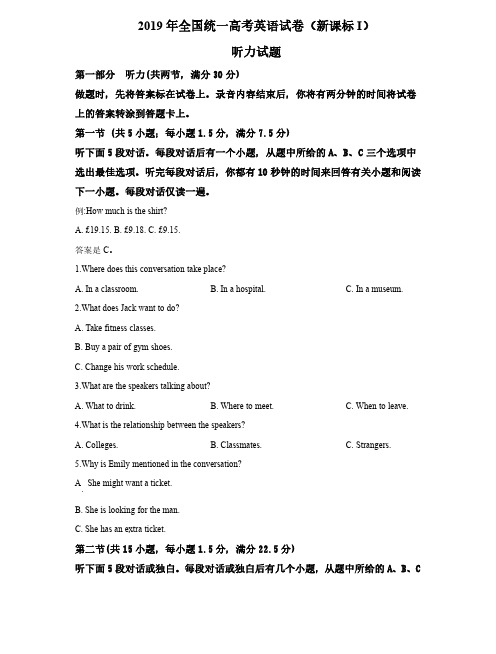
2019年全国统一高考英语试卷(新课标I)听力试题第一部分听力(共两节,满分30分)做题时,先将答案标在试卷上。
录音内容结束后,你将有两分钟的时间将试卷上的答案转涂到答题卡上。
第一节(共5小题;每小题1.5分,满分7.5分)听下面5段对话。
每段对话后有一个小题,从题中所给的A、B、C三个选项中选出最佳选项。
听完每段对话后,你都有10秒钟的时间来回答有关小题和阅读下一小题。
每段对话仅读一遍。
例:How much is the shirt?A.£19.15.B.£9.18.C.£9.15.答案是C。
1.Where does this conversation take place?A.In a classroom.B.In a hospital.C.In a museum.2.What does Jack want to do?A.Take fitness classes.B.Buy a pair of gym shoes.C.Change his work schedule.3.What are the speakers talking about?A.What to drink.B.Where to meet.C.When to leave.4.What is the relationship between the speakers?A.Colleges.B.Classmates.C.Strangers.5.Why is Emily mentioned in the conversation?A.She might want a ticket.B.She is looking for the man.C.She has an extra ticket.第二节(共15小题,每小题1.5分,满分22.5分)听下面5段对话或独白。
每段对话或独白后有几个小题,从题中所给的A、B、C三个选项中选出最佳选项。
2019年高考全国Ⅰ卷英语试题(含听力音频、听力原文和答案)

绝密★启用前2019年普通高等学校招生全国统一考试英语Ⅰ卷(2019)英语听力音频 双击图标打开收听.mp4适用地区:河北、河南、山西、山东、江西、安徽、湖北、湖南、广东、福建注意事项:1.答卷前,考生务必将自己的姓名、考生号等填写在答题卡和试卷指定位置上。
2.回答选择题时,选出每小题答案后,用铅笔把答题卡上对应题目的答案标号涂黑。
如需改动,用橡皮擦干净后,再选涂其他答案标号。
回答非选择题时,将答案写在答题卡上,写在本试卷上无效。
3.考试结束后,将本试卷和答题卡一并交回。
第一部分听力(共两节,满分30分)做题时,先将答案标在试卷上。
录音内容结束后,你将有两分钟的时间将试卷上的答案转涂到答题卡上。
第一节(共5小题;每小题1.5分,满分7.5分)听下面5段对话。
每段对话后有一个小题,从题中所给的A、B、C三个选项中选出最佳选项。
听完每段对话后,你都有10秒钟的时间来回答有关小题和阅读下一小题。
每段对话仅读一遍。
例:How much is the shirt?A. £19.15.B. £9.18.C. £9.15.答案是C。
1.Where does this conversation take place?A. In a classroom.B. In a hospital.C. In a museum. 2.What does Jack want to do?A. Take fitness classes.B. Buy a pair of gym shoes.C. Change his work schedule.3.What are the speakers talking about?A. What to drink.B. Where to meet.C. When to leave.4.What is the relationship between the speakers?A. Colleagues.B. Classmates.C. Strangers.5.Why is Emily mentioned in the conversation?A. She might want a ticket.B. She is looking for the man.C. She has an extra ticket.第二节(共15小题;每小题1.5分,满分22.5分)听下面5段对话或独白。
【深度解析高考真题】2019年全国高考英语试卷听力+原文+答案(新课标Ⅱ、Ⅲ)
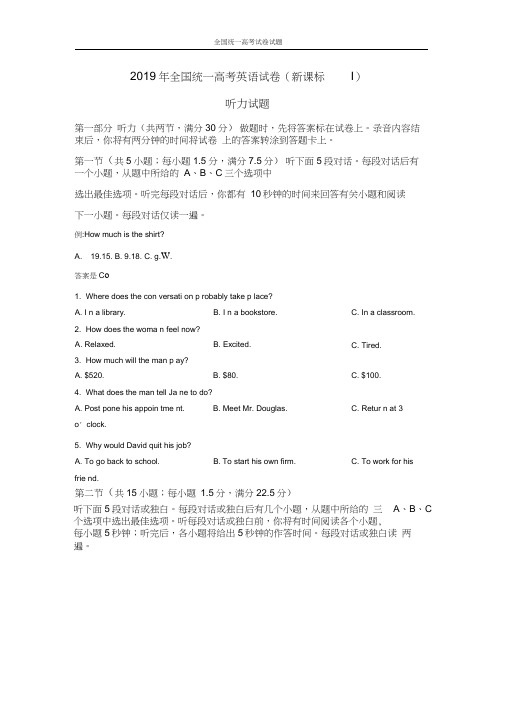
2019年全国统一高考英语试卷(新课标I )听力试题第一部分 听力(共两节,满分30分) 做题时,先将答案标在试卷上。
录音内容结束后,你将有两分钟的时间将试卷 上的答案转涂到答题卡上。
第一节(共5小题;每小题1.5分,满分7.5分) 听下面5段对话。
每段对话后有一个小题,从题中所给的 A 、B 、C 三个选项中选出最佳选项。
听完每段对话后,你都有 10秒钟的时间来回答有关小题和阅读 下一小题。
每段对话仅读一遍。
例:How much is the shirt?A. 19.15.B. 9.18.C. g.W .答案是C o1. Where does the con versati on p robably take p lace?2. How does the woma n feel now?3. How much will the man p ay?4. What does the man tell Ja ne to do?o ' clock.5. Why would David quit his job?frie nd.听下面5段对话或独白。
每段对话或独白后有几个小题,从题中所给的 三个选项中选出最佳选项。
听每段对话或独白前,你将有时间阅读各个小题,每小题5秒钟;听完后,各小题将给出5秒钟的作答时间。
每段对话或独白读 两遍。
A. I n a library.B. I n a bookstore.C. In a classroom.A. Relaxed.B. Excited.C. Tired.A. $520.B. $80.C. $100.A. Post pone his appoin tme nt.B. Meet Mr. Douglas.C. Retur n at 3A. To go back to school.B. To start his own firm.C. To work for his第二节(共15小题;每小题 1.5分,满分22.5分)A 、B 、C听下面一段较长对话,回答以下小题。
2019年全国高考英语听力试题、原文及答案
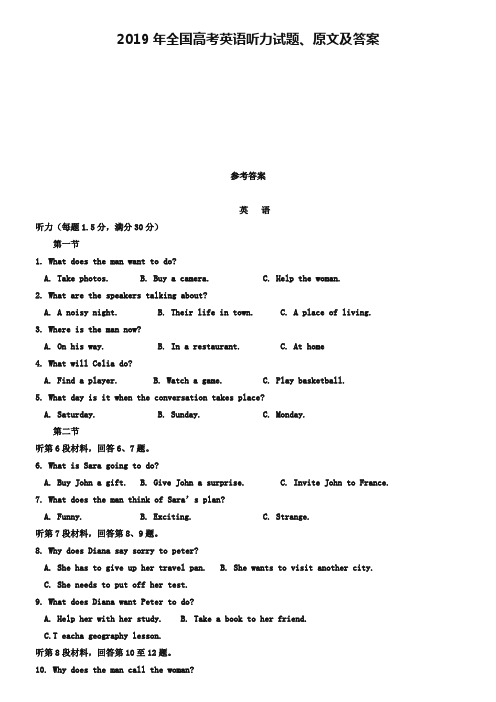
2019年全国高考英语听力试题、原文及答案参考答案英语听力(每题1.5分,满分30分)第一节1. What does the man want to do?A. Take photos.B. Buy a camera.C. Help the woman.2. What are the speakers talking about?A. A noisy night.B. Their life in town.C. A place of living.3. Where is the man now?A. On his way.B. In a restaurant.C. At home4. What will Celia do?A. Find a player.B. Watch a game.C. Play basketball.5. What day is it when the conversation takes place?A. Saturday.B. Sunday.C. Monday.第二节听第6段材料,回答6、7题。
6. What is Sara going to do?A. Buy John a gift.B. Give John a surprise.C. Invite John to France.7. What does the man think of Sara’s plan?A. Funny.B. Exciting.C. Strange.听第7段材料,回答第8、9题。
8. Why does Diana say sorry to peter?A. She has to give up her travel pan.B. She wants to visit another city.C. She needs to put off her test.9. What does Diana want Peter to do?A. Help her with her study.B. Take a book to her friend.C.T eacha geography lesson.听第8段材料,回答第10至12题。
2019年高考全国Ⅱ卷英语试题(含听力音频、听力原文和答案)

绝密★启用前2019年普通高等学校招生全国统一考试英语Ⅱ卷(2019)英语听力音频 双击图标打开收听.mp4适用地区:内蒙古/黑龙江/辽宁/吉林/重庆/陕西/甘肃/宁夏/青海/新疆/海南注意事项:1.答卷前,考生务必将自己的姓名、考生号等填写在答题卡和试卷指定位置上。
2.回答选择题时,选出每小题答案后,用铅笔把答题卡上对应题目的答案标号涂黑。
如需改动,用橡皮擦干净后,再选涂其他答案标号。
回答非选择题时,将答案写在答题卡上,写在本试卷上无效。
3.考试结束后,将本试卷和答题卡一并交回。
第一部分听力(共两节,满分30分)做题时,先将答案标在试卷上。
录音内容结束后,你将有两分钟的时间将试卷上的答案转涂到答题卡上。
第一节(共5小题;每小题1.5分,满分7.5分)听下面5段对话。
每段对话后有一个小题,从题中所给的A、B、C三个选项中选出最佳选项。
听完每段对话后,你都有10秒钟的时间来回答有关小题和阅读下一小题。
每段对话仅读一遍。
例:How much is the shirt?A. £19.15.B. £9.18.C. £9.15.答案是C。
1.Where does the conversation probably take place?A. In a library.B. In a bookstore.C. In a classroom. 2.How does the woman feel now?A. Relaxed.B. Excited.C. Tired.3.How much will the man pay?A. $20.B. $80.C. $100.4.What does the man tell Jane to do?A. Postpone his appointment.B. Meet Mr. Douglas.C. Return at 3 o’clock. 5.Why would David quit his job?A. To go back to school.B. To start his own firm.C. To work for his friend.第二节(共15小题;每小题1.5分,满分22.5分)听下面5段对话或独白。
2019年高考英语试卷听力+原文+答案(新课标2卷、3卷)
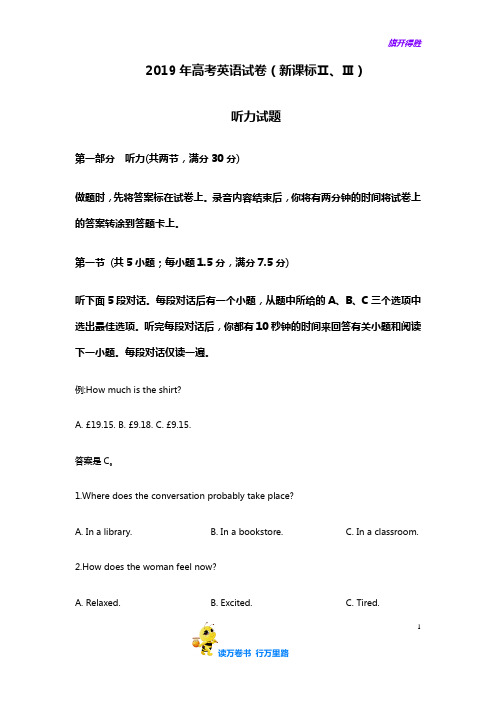
2019年高考英语试卷(新课标Ⅱ、Ⅲ)听力试题第一部分听力(共两节,满分30分)做题时,先将答案标在试卷上。
录音内容结束后,你将有两分钟的时间将试卷上的答案转涂到答题卡上。
第一节(共5小题;每小题1.5分,满分7.5分)听下面5段对话。
每段对话后有一个小题,从题中所给的A、B、C三个选项中选出最佳选项。
听完每段对话后,你都有10秒钟的时间来回答有关小题和阅读下一小题。
每段对话仅读一遍。
例:How much is the shirt?A. £19.15.B. £9.18.C. £9.15.答案是C。
1.Where does the conversation probably take place?A. In a library.B. In a bookstore.C. In a classroom.2.How does the woman feel now?A. Relaxed.B. Excited.C. Tired.13.How much will the man pay?A. $520.B. $80.C. $100.4.What does the man tell Jane to do?A. Postpone his appointment.B. Meet Mr. Douglas.C. Return at 3 o’clock.5.Why would David quit his job?A. T o go back to school.B. To start his own firm.C. T o work for his friend.第二节(共15小题;每小题1.5分,满分22.5分)听下面5段对话或独白。
每段对话或独白后有几个小题,从题中所给的A、B、C三个选项中选出最佳选项。
听每段对话或独白前,你将有时间阅读各个小题,每小题5秒钟;听完后,各小题将给出5秒钟的作答时间。
2019年全国一卷高考英语听力答案原文材料-19年全国一卷听力
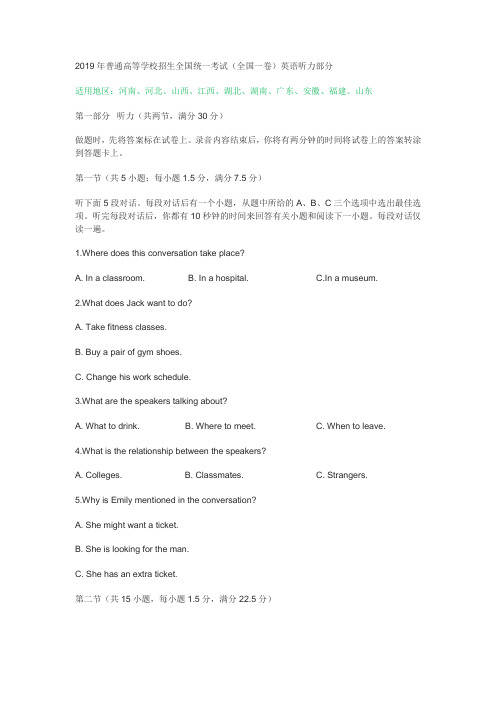
2019年普通高等学校招生全国统一考试(全国一卷)英语听力部分适用地区:河南、河北、山西、江西、湖北、湖南、广东、安徽、福建、山东第一部分听力(共两节,满分30分)做题时,先将答案标在试卷上。
录音内容结束后,你将有两分钟的时间将试卷上的答案转涂到答题卡上。
第一节(共5小题;每小题1.5分,满分7.5分)听下面5段对话。
每段对话后有一个小题,从题中所给的A、B、C三个选项中选出最佳选项。
听完每段对话后,你都有10秒钟的时间来回答有关小题和阅读下一小题。
每段对话仅读一遍。
1.Where does this conversation take place?A. In a classroom.B. In a hospital.C.In a museum.2.What does Jack want to do?A. Take fitness classes.B. Buy a pair of gym shoes.C. Change his work schedule.3.What are the speakers talking about?A. What to drink.B. Where to meet.C. When to leave.4.What is the relationship between the speakers?A. Colleges.B. Classmates.C. Strangers.5.Why is Emily mentioned in the conversation?A. She might want a ticket.B. She is looking for the man.C. She has an extra ticket.第二节(共15小题,每小题1.5分,满分22.5分)听下面5段对话或独白。
每段对话或独白后有几个小题,从题中所给的A、B、C三个选项中选出最佳选项。
2019年全国高考英语试卷听力+原文+答案(新课标Ⅱ、Ⅲ)
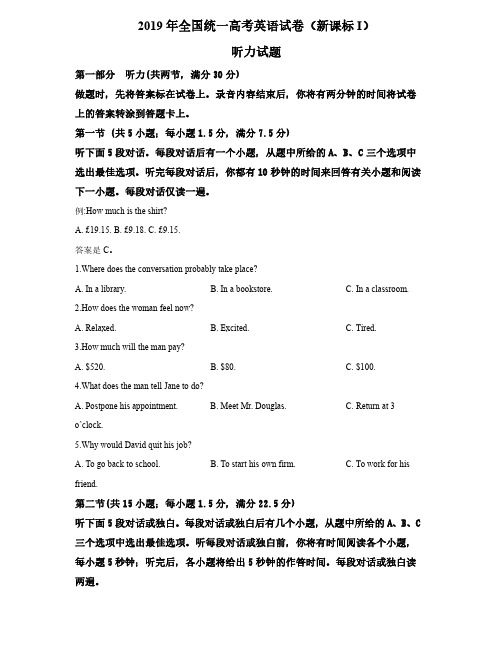
2019年全国统一高考英语试卷(新课标I)听力试题第一部分听力(共两节,满分30分)做题时,先将答案标在试卷上。
录音内容结束后,你将有两分钟的时间将试卷上的答案转涂到答题卡上。
第一节(共5小题;每小题1.5分,满分7.5分)听下面5段对话。
每段对话后有一个小题,从题中所给的A、B、C三个选项中选出最佳选项。
听完每段对话后,你都有10秒钟的时间来回答有关小题和阅读下一小题。
每段对话仅读一遍。
例:How much is the shirt?A.£19.15.B.£9.18.C.£9.15.答案是C。
1.Where does the conversation probably take place?A.In a library.B.In a bookstore.C.In a classroom.2.How does the woman feel now?A.Relaxed.B.Excited.C.Tired.3.How much will the man pay?A.$520.B.$80.C.$100.4.What does the man tell Jane to do?A.Postpone his appointment.B.Meet Mr.Douglas.C.Return at3o’clock.5.Why would David quit his job?A.To go back to school.B.To start his own firm.C.To work for his friend.第二节(共15小题;每小题1.5分,满分22.5分)听下面5段对话或独白。
每段对话或独白后有几个小题,从题中所给的A、B、C 三个选项中选出最佳选项。
听每段对话或独白前,你将有时间阅读各个小题,每小题5秒钟;听完后,各小题将给出5秒钟的作答时间。
每段对话或独白读两遍。
听下面一段较长对话,回答以下小题。
2019年全国统一高考英语试卷(新课标ⅱ)和答案

2019年全国统一高考英语试卷(新课标Ⅱ)第一部分听力(共两节)第一节(共5小题;每小题1.5分,满分7.5分)听下面5段对话。
每段对话后有一个小题,从题中所给的A、B、C三个选项中选出最佳选项.听完每段对话后,你都有10秒钟的时间来回答有关小题和阅读下一小题.每段对话仅读一遍.1.(1.5分)Where does the conversation probably take place?A.In a library.B.In a bookstore.C.In a classroom.2.(1.5分)How does the woman feel now?A.Relaxed.B.Excited.C.Tired.3.(1.5分)How much will the man pay?A.﹩20.B.﹩80.C.﹩100.4.(1.5分)What does the man tell Jane to do?A.Postpone his appointment.B.Meet Mr.Douglas.C.Return at 3 o'clock.5.(1.5分)Why would David quit his job?A.To go back to school.B.To start his own firm.C.To work for his friend.第二节(每小题1.5分,满分22.5分)听下面5段对话或独白.每段对话或独白后有几个小题,从题中所给的A、B、C三个选项中选出最佳选项.听每段对话或独白前,你将有时间阅读各个小题,每小题5秒钟;听完后,各小题将给出5秒钟的作答时间.每段对话或独白读两遍.6.(3分)听材料,回答下列问题.(1)What does the man want the woman to do?A.Check the cupboard.B.Clean the balcony.C.Buy an umbrella.(2)What is the probable relationship between the speakers?A.Husband and wife.B.Employer and employee.C.Shop assistant and customer.7.(4.5分)听材料,回答下列问题.(1)Where did the woman go at the weekend?A.The city centre.B.The forest park.C.The man's home.(2)How did the man spend his weekend?A.Packing for a move.B.Going out with Jenny.C.Looking for a new house.(3)What will the woman do for the man?A.Take Henry to hospital.B.Stay with his kid.C.Look after his pet.8.(4.5分)听材料,回答下列问题.(1)What is Mr.Stone doing now ?A.Eating lunch.B.Having a meeting.C.Writing a diary.(2)Why does the man want to see Mr.Stone?A.To discuss a program.B.To make a travel plan.C.To ask for sick leave.(3)When will the man meet Mr.Stone this afternoon?A.At 3:00.B.At 3:30.C.At 3:45.9.(4.5分)听材料,回答下列问题.(1)What are the speakers talking about?A.A company.B.An interview.C.A job offer.(2)Who is Monica Stansfield?A.A junior specialist.B.A department manager.C.A sales assistant.(3)When will the man hear from the woman?A.On Tuesday.B.On Wednesday.C.On Thursday.10.(6分)听材料,回答下列问题.(1)What did John enjoy doing in his childhood?A.Touring France.B.Playing outdoors.C.Painting pictures.(2)What did John do after he moved to the US?A.He did business.B.He studied biology.C.He worked on a farm.(3)Why did John go hunting?A.For food.B.For pleasure.C.For money.(4)What is the subject of John's works?A.American birds.B.Natural scenery.C.Family life.第二部分阅读理解(共两节)第一节(满分30分)阅读下列短文,从每题所给的A、B、C和D四个选项中,选出最佳选项.11.(6分)My Favourite BooksJo Usmar is a writer for Cosmopolitan and co﹣author of the This Book Will series(系列)of lifestyle books.Here she picks her top reads.MatildaRoald DahlI once wrote a paper on the influence of fairy tales on Roald Dahl's writing and it gave me a new appreciation for his strange and delightful worlds.Matilda's battles with her cruel parents and the bossy headmistress,Miss Trunchbull,are equally funny and frightening,but they're also aspirational.After DarkHaruki MurakamiIt's about two sisters ﹣Eri,a model who either won't or can′t stop sleeping,and Mari,a young student.In trying to connect to her sister,Mari starts changing her life and discovers a world of diverse "night people" who are hiding secrets.Gone GirlGillian FlynnThere was a bit of me that didn′t want to love this when everyone else on the planet did,but the horror story is brilliant.There's tension and anxiety from the beginning as Nick and Amy battle for your trust.It's a real whodunit and the frustration when you realise what's going on is horribly enjoyable.The StandStephen KingThis is an excellent fantasy novel from one of the best storytellers around.After a serious flu outbreak wipes out 99.4% of the world′s population,a battle unfolds between good and evil among those left.Randall Flagg is one of the scariest characters ever.(1)Who does "I" refer to in the text?A.Stephen King.B.Gillian Flynn.C.Jo Usmar.D.Roald Dahl.(2)Which of the following tells about Mari and Eri?A.Cosmopolitan.B.Matilda.C.After Dark.D.The Stand.(3)What kind of book is Gone Girl?A.A folk tale.B.A biography.C.A love story.D.A horror story.12.(8分)"Y ou can use me as a last resort(选择),and if nobody else volunteers,then I will do it."This was an actual reply froma parent after I put out a request for volunteers for my kids'lacrosse(长曲棍球)club.I guess that there's probably some demanding work schedule,or social anxiety around stepping up to help for an unknown sport.She may just need a little persuading.So I try again and tug at the heartstrings.I mention the single parent with four kids running the show and I talk about the dad coaching a team that hiskids aren't even on…At this point the unwilling parent speaks up,"Alright.Yes,I'll do it."I'm secretly relieved because I know there's real power in sharing volunteer responsibilities among many.The unwilling parent organizes the meal schedule,sends out emails,and collects money for end﹣of﹣season gifts.Somewhere along the way,the same parent ends up becoming an invaluable member of the team.The coach is able to focus on the kids while the other parents are relieved to be off the hook for another season.Handing out sliced oranges to bloodthirsty kids can be as exciting as watching your own kid score a goal.Still,most of us volunteers breathe a sigh of relief when the season comes to a close.That relief is coupled with a deep understanding of why the same people keep coming back for more:Connecting to the community (社区)as you freely give your time,money,skills,or services provides a real joy.Volunteering just feels so good.In that sense,I'm pretty sure volunteering is more of a selfish act than I'd freely like to admit.However,if others benefit in the process,and I get some reward too,does it really matter where my motivation lies?(1)What can we infer about the parent from her reply in paragraph 1?A.She knows little about the club.B.She isn't good at sports.C.She just doesn't want to volunteer.D.She's unable to meet her schedule.(2)What does the underlined phrase"tug at the heartstrings"in paragraph 2 mean?A.Encourage teamwork.B.Appeal to feelings.C.Promote good deeds.D.Provide advice.(3)What can we learn about the parent from paragraph 3?A.She gets interested in lacrosse.B.She is proud of her kids.C.She'll work for another season.D.She becomes a good helper.(4)Why does the author like doing volunteer work?A.It gives her a sense of duty.B.It makes her very happy.C.It enables her to work hard.D.It brings her material rewards.13.(8分)Marian Bechtel sits at West Palm Beach's Bar Louie counter by herself,quietly reading her e﹣book as she waits for her salad.What is she reading?None of your business! Lunch is Bechtel's "me" time.And like more Americans,she's not alone.A new report found 46 percent of meals are eaten alone in America.More than half(53 percent)have breakfast alone and nearly half(46 percent)have lunch by themselves.Only at dinnertime are we eating together anymore,74 percent,according to statistics from the report."I prefer to go out and be out.Alone,but together,you know?" Bechtel said,looking up from her book.Bechtel,who works in downtown West Palm Beach,has lunch with coworkers sometimes,but like many of us,too often works through lunch at her desk.A lunchtime escape allows her to keep a boss from tapping her on the shoulder.She retuns to work feeling energized."Today,I just wanted some time to myself,"she said.Just two seats over,Andrew Mazoleny,a local videographer,is finishing his lunch at the bar.He likes that he can sit and check his phone in peace or chat up the barkeeper with whom he's on a first﹣name basis if he wants to have a little interaction(交流)."I reflect on how my day's gone and think about the rest of the week,"he said,"It's a chance for self﹣reflection.You return to workrecharged and with a plan."That freedom to choose is one reason more people like to eat alone.There was a time when people may have felt awkward about asking for a table for one,but those days are over.Now,we have our smartphones to keep us company at the table."It doesn't feel as alone as it may have before all the advances in technology," said Laurie Demeritt,whose company provided the statistics for the report.(1)What are the statistics in paragraph 2 about?A.Food variety.B.Eating habits.C.Table manners.D.Restaurant service.(2)Why does Bechtel prefer to go out for lunch?A.To meet with her coworkers.B.To catch up with her work.C.To have some time on her own.D.To collect data for her report.(3)What do we know about Mazoleny?A.He makes videos for the bar.B.He's fond of the food at the bar.C.He interviews customers at the bar.D.He's familiar with the barkeeper.(4)What is the text mainly about?A.The trend of having meals alone.B.The importance of self﹣reflection.C.The stress from working overtime.D.The advantage of wireless technology.14.(8分)Bacteria are an annoying problem for astronauts.The microorganisms(微生物)from our bodies grow uncontrollably on surfaces of the International Space Station,so astronauts spend hours cleaning them up each week.How is NASA overcoming this very tiny big problem?It's turning to a bunch of high school kids.But not just any kids.It is depending on NASA HUNCH high school classrooms,like the one science teachers Gene Gordon and Donna Himmelberg lead at Fairport High School in Fairport,New York.HUNCH is designed to connect high school classrooms with NASA engineers.For the past two years,Gordon's students have been studying ways to kill bacteria in zero gravity,and they think they're close to a solution(解决方案)."We don't give the students any breaks.They have to do it just like NASA engineers," says Florence Gold,a project manager."There are no tests,"Gordon says."There is no graded homework.There almost are no grades,other than ‘Are you working towards your goal ?' Basically,it's ‘I've got to produce this product and then,at the end of the year,present it to NASA.' Engineers come and really do an in﹣person review,and…it's not a very nice thing at times.It's a hard business review of your product."Gordon says the HUNCH program has an impact (影响)on college admissions and practical life skills."These kids are so absorbed in their studies that I just sit back.I don't teach."And that annoying bacteria?Gordon says his students are emailing daily with NASA engineers about the problem,readying a workable solution to test in space.(1)What do we know about the bacteria in the International Space Station?A.They are hard to get rid of.B.They lead to air pollution.C.They appear in different forms.D.They damage the instruments.(2)What is the purpose of the HUNCH program?A.To strengthen teacher﹣student relationships.B.To sharpen students' communication skills.C.To allow students to experience zero gravity.D.To link space technology with school education.(3)What do the NASA engineers do for the students in the program?A.Check their product.B.Guide project designs.C.Adjust work schedules.D.Grade their homework.(4)What is the best title for the text?A.NASA:The Home of AstronautsB.Space:The Final Homework FrontierC.Nature:An Outdoor ClassroomD.HUNCH:A College Admission Reform第二节(满分10分)根据短文内容,从短文后的选项中选出能填入空白处的最佳选项.选项中有两项为多余选项.15.(10分)Imagine a child standing on a diving board four feet high and asking himself the question:"Should I jump?" This is what motivation or the lack of it can do.Motivation and goal setting are the two sides of the same coin.(1).Like the child on the diving board,you will stay undecided.(2).More than that,how should you staymotivated to achieve the goal?First,you need to evaluate yourself,your values,your strengths,your weaknesses,your achievements,your desires,etc.Only then should you set your goals.You also need to judge the quality and depth of your motivation.This is quite important,because it is directly related to your commitment.There are times when your heart is not in your work.(3).So,slow down and think what you really want to do at that moment.Clarity (清晰)of thoughts can help you move forward.Another way of setting realistic goals is to analyze your short and long term objectives,keeping in mind your beliefs,values and strengths.Remember that goals are flexible.(4).They also need to be measurable.You must keep these points in mind while setting your goals.Your personal circumstances are equally important.For example,you may want to be a pilot but can't become one because your eyesight is not good enough.(5).You should reassess your goals,and motivate yourself to set a fresh goal.You will surely need to overcome some difficulties,some planned,but most unplanned.Y ou cannot overcome them withoutample motivation.Make sure that you plan for these difficulties at the time of setting your goals.A.This can affect your work.B.So how should you motivate yourself?C.However,this should not discourage you.D.So why should we try to set specific goals?E.They can change according to circumstances.F.Motivation is what you need most to do a good job.G.Without motivation,you can neither set a goal nor reach it.第三部分语言知识运用(共两节)第一节(每小题1.5分,满分30分)阅读下面短文,从短文后各题所给的A、B、C和D四个选项中,选出可以填入空白处的最佳选项.16.(30分)It's about 250 miles from the hills of west﹣central Iowa to Ehlers' home in Minnesota.During the long trip home,followinga weekend of hunting,Ehlers(1)about the small dog hehad seen (2)alongside the road.He had (3)to coax(哄)the dog to him but,frightened,it had (4).Back home,Ehlers was troubled by that (5)dog.So,four days later,he called his friend Greg,and the two drove (6).After a long and careful (7),Greg saw,across a field,the dog moving (8)away.Ehlerseventually succeeded in coaxing the animal to him.Nervousness and fear were replaced with (9).It just started licking (舔)Ehlers' face.A local farmer told them the dog sounded like one (10)as lost in the local paper.The ad had a (11)number for a town in southern Michigan.Ehlers (12)the number of Jeff and Lisa to tell them he had (13)their dog.Jeff had (14)in Iowa before Thanksgiving with his dog,Rosie,but the gun shots had scared the dog off.Jeff searched (15)for Rosie in the next four days.Ehlers returned to Minnesota,and then drove 100 miles to Minneapolis to put Rosie on a flight to Michigan."It's good to know there's still someone out there who (16)enough to go to that kind of (17)," says Lisa of Ehlers' rescue (18)."I figured whoever lost the dog was probably just as (19)to it as I am to my dogs,"says Ehlers."If it had been my dog,I'd hope that somebody would be (20)to go that extra mile."(1)A.read B.forgot C.thought D.heard(2)A.fighting B.trembling C.eating D.sleeping (3)A.tried B.agreed C.promised D.regretted(4)A.calmedB.stood up C.rolled over D.run offdow(5)A.injured B.stolen C.lost D.rescued (6)A.home B.past C.back D.onB.explanation C.test D.search (7)A.preparation(8)A.cautiously B.casually C.skillfully D.angrily (9)A.surprise B.joy C.hesitation D.anxiety (10)A.predicted B.advertised C.believed D.recorded (11)A.house B.phone C.street D.car(12)A.called B.copied C.counted D.remembered (13)A.fed B.adopted C.found D.cured (14)A.hunted B.skied C.lived D.workedB.on time C.in turn D.in vain (15)A.onpurpose(16)A.cares B.sees C.suffers D.learns (17)A.place B.trouble C.waste D.extreme (18)A.service B.plan C.effort D.team (19)A.equal B.allergic C.grateful D.close (20)A.suitable B.proud C.wise D.willing第二节(每小题1.5分,满分15分)阅读下面短文,在空白处填入1个适当的单词或括号内单词的正确形式。
08-19高考听力解析答案
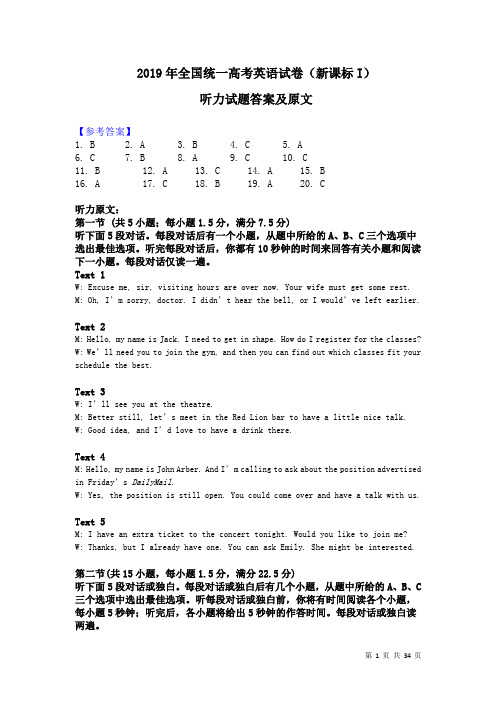
2019年全国统一高考英语试卷(新课标I)听力试题答案及原文【参考答案】1. B2. A3. B4. C5. A6. C7. B8. A9. C 10. C11. B 12. A 13. C 14. A 15. B16. A 17. C 18. B 19. A 20. C听力原文:第一节 (共5小题;每小题1.5分,满分7.5分)听下面5段对话。
每段对话后有一个小题,从题中所给的A、B、C三个选项中选出最佳选项。
听完每段对话后,你都有10秒钟的时间来回答有关小题和阅读下一小题。
每段对话仅读一遍。
Text 1W: Excuse me, sir, visiting hours are over now. Your wife must get some rest. M: Oh, I’m sorry, doctor. I didn’t hear the bell, or I would’ve left earlier.Text 2M: Hello, my name is Jack. I need to get in shape. How do I register for the classes? W: We’ll need you to join the gym, and then you can find out which classes fit your schedule the best.Text 3W: I’ll see you at the theatre.M: Better still, let’s meet in the Red Lion bar to have a little nice talk. W: Good idea, and I’d love to have a drink there.Text 4M: Hello, my name is John Arber. And I’m calling to ask about the position advertised in Friday’s DailyMail.W: Yes, the position is still open. You could come over and have a talk with us.Text 5M: I have an extra ticket to the concert tonight. Would you like to join me? W: Thanks, but I already have one. You can ask Emily. She might be interested.第二节(共15小题,每小题1.5分,满分22.5分)听下面5段对话或独白。
2019年全国统一高考英语试卷以及答案(全国1卷解析版)-19年全国一英语
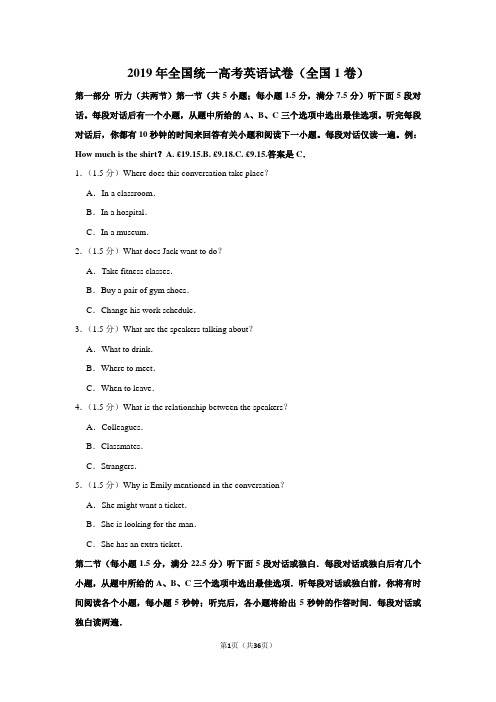
2019年全国统一高考英语试卷(全国1卷)第一部分听力(共两节)第一节(共5小题;每小题1.5分,满分7.5分)听下面5段对话。
每段对话后有一个小题,从题中所给的A、B、C三个选项中选出最佳选项。
听完每段对话后,你都有10秒钟的时间来回答有关小题和阅读下一小题。
每段对话仅读一遍。
例:How much is the shirt?A. £19.15.B. £9.18.C. £9.15.答案是C.1.(1.5分)Where does this conversation take place?A.In a classroom.B.In a hospital.C.In a museum.2.(1.5分)What does Jack want to do?A.Take fitness classes.B.Buy a pair of gym shoes.C.Change his work schedule.3.(1.5分)What are the speakers talking about?A.What to drink.B.Where to meet.C.When to leave.4.(1.5分)What is the relationship between the speakers?A.Colleagues.B.Classmates.C.Strangers.5.(1.5分)Why is Emily mentioned in the conversation?A.She might want a ticket.B.She is looking for the man.C.She has an extra ticket.第二节(每小题1.5分,满分22.5分)听下面5段对话或独白.每段对话或独白后有几个小题,从题中所给的A、B、C三个选项中选出最佳选项.听每段对话或独白前,你将有时间阅读各个小题,每小题5秒钟;听完后,各小题将给出5秒钟的作答时间.每段对话或独白读两遍.6.(3分)听材料,回答下列问题.(1)How long did James run his business?A.10 years.B.13 years.C.15 years.(2)How does the woman feel about James' situation?A.Embarrassed.B.Concerned.C.Disappointed.7.(4.5分)听材料,回答下列问题.(1)What has Kate's mother decided to do?A.Return to school.B.Change her job.C.Retire from work.(2)What did Kate's mother study at college?A.Oil painting.B.Art history.C.Business administration.(3)What is Kate's attitude toward her mother's decision?A.Disapproving.B.Ambiguous.C.Understanding.8.(4.5分)听材料,回答下列问题.(1)What is the man doing?A.Chairing a meeting.B.Hosting a radio program.C.Conducting a job interview.(2)What benefits Mary most in her job?A.Her wide reading.B.Her leaders' guidance.C.Her friends' help.(3)Who will Mary talk about next?A.Her teacher.B.Her father.C.Her mother.9.(6分)听材料,回答下列问题.(1)Why does the man seldom do exercise?A.He lacks motivation.B.He has a heart problem.C.He works all the time.(2)What does Jacob Sattelmair probably do?A.He's an athlete.B.He's a researcher.C.He's a journalist.(3)Why does the woman speak of a study?A.To encourage the man.B.To recommend an exercise.C.To support her findings.(4)How much time will the man probably spend exercising weekly?A.300 minutes.B.150 minutes.C.75 minutes.10.(4.5分)听材料,回答下列问题.(1)What did the scientists do to the road?A.They repaired it.B.They painted it.C.They blocked it.(2)Why are young birds drawn to the road surface?A.It's warm.B.It's brown.C.It's smooth.(3)What is the purpose of the scientists' experiment?A.To keep the birds there for a whole year.B.To help students study the birds well.C.To prevent the birds from being killed.第二部分阅读理解(共两节)第一节(满分30分)阅读下列短文,从每题所给的A、B、C和D四个选项中,选出最佳选项。
2008年全国统一高考英语试卷听力+原文+答案(全国卷Ⅰ、Ⅱ)
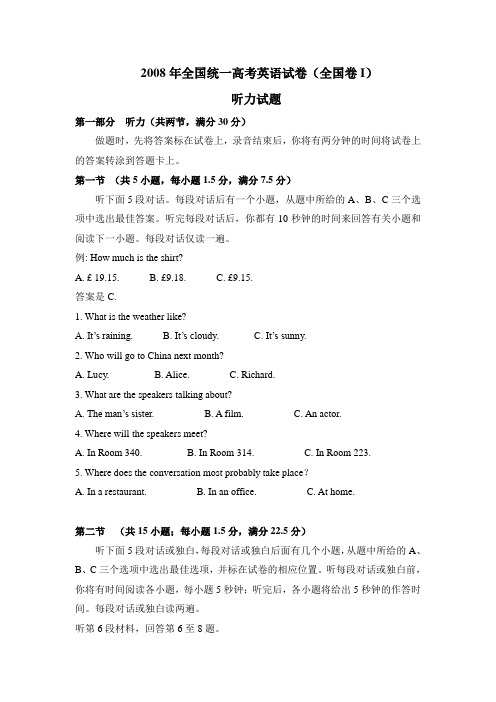
2008年全国统一高考英语试卷(全国卷I)听力试题第一部分听力(共两节,满分30分)做题时,先将答案标在试卷上,录音结束后,你将有两分钟的时间将试卷上的答案转涂到答题卡上。
第一节(共5小题,每小题1.5分,满分7.5分)听下面5段对话。
每段对话后有一个小题,从题中所给的A、B、C三个选项中选出最佳答案。
听完每段对话后,你都有10秒钟的时间来回答有关小题和阅读下一小题。
每段对话仅读一遍。
例: How much is the shirt?A. £ 19.15.B. £9.18.C. £9.15.答案是C.1. What is the weather like?A. It’s raining.B. It’s cloudy.C. It’s sunny.2. Who will go to China next month?A. Lucy.B. Alice.C. Richard.3. What are the speakers talking about?A. The man’s sister.B. A film.C. An actor.4. Where will the speakers meet?A. In Room 340.B. In Room 314.C. In Room 223.5. Where does the conversation most probably take place?A. In a restaurant.B. In an office.C. At home.第二节(共15小题;每小题1.5分,满分22.5分)听下面5段对话或独白,每段对话或独白后面有几个小题,从题中所给的A、B、C三个选项中选出最佳选项,并标在试卷的相应位置。
听每段对话或独白前,你将有时间阅读各小题,每小题5秒钟;听完后,各小题将给出5秒钟的作答时间。
每段对话或独白读两遍。
听第6段材料,回答第6至8题。
2019年高考英语全国卷答案
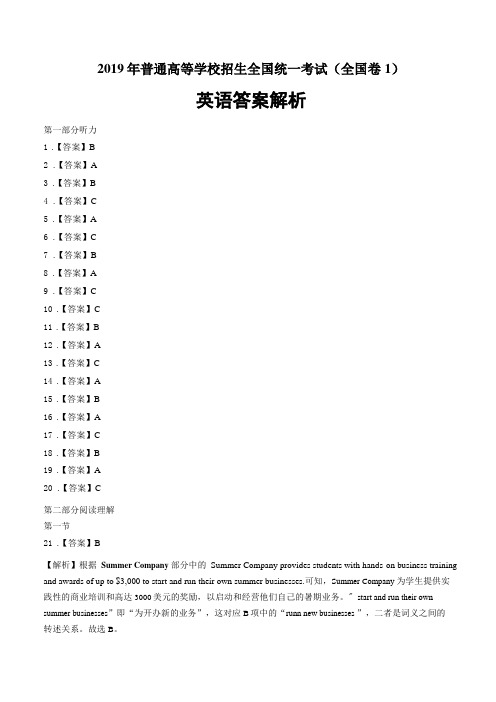
2019年普通高等学校招生全国统一考试(全国卷1)英语答案解析第一部分听力1.【答案】B2.【答案】A3.【答案】B4.【答案】C5.【答案】A6.【答案】C7.【答案】B8.【答案】A9.【答案】C10.【答案】C11.【答案】B12.【答案】A13.【答案】C14.【答案】A15.【答案】B16.【答案】A17.【答案】C18.【答案】B19.【答案】A20.【答案】C第二部分阅读理解第一节21.【答案】B【解析】根据Summer Company 部分中的Summer Company provides students with hands-on business training and awards of up to $3,000 to start and run their own summer businesses.可知,Summer Company 为学生提供实践性的商业培训和高达3000美元的奖励,以启动和经营他们自己的暑期业务。
" start and run their own summer businesses”即“为开办新的业务”,这对应B项中的“runn new businesses ”,二者是词义之间的转述关系。
故选B。
【考点】细节理解22.【答案】D【解析】根据Stewardship Youth Ranger Program部分中Who is eligible: Students aged 16 or 17 at time of hire, but not turning 18 before December 31 this yeailT知,符合条件的学生是16岁或17岁的学生,但在今年12月31日之前未满18岁。
由此得出,这个项目要求年龄在16-17岁之间。
故选D。
【考点】细节理解23.【答案】D【解析】根据Summer Employment Opportunities部分中最后一句Some positions require students to be 15 to 24 or up to 29 for persons with a disability可知,Summer Employment Opportunities有些职位是给残疾人的。
2008年高考英语试卷听力+原文+答案(全国卷Ⅰ、Ⅱ)

2008年全国统一高考英语试卷(全国卷I)听力试题第一部分听力(共两节,满分30分)做题时,先将答案标在试卷上,录音结束后,你将有两分钟的时间将试卷上的答案转涂到答题卡上.第一节(共5小题,每小题1.5分,满分7.5分)听下面5段对话.每段对话后有一个小题,从题中所给的A、B、C三个选项中选出最佳答案.听完每段对话后,你都有10秒钟的时间来回答有关小题和阅读下一小题.每段对话仅读一遍.例: How much is the shirt?A. £ 19.15.B. £9.18.C. £9.15.答案是C.1. What is the weather like?A. It’s raining.B. It’s cloudy.C. It’s sunny.2. Who will go to China next month?A. Lucy.B. Alice.C. Richard.3. What are the speakers talking about?A. The man’s sister.B. A film.C. An actor.4. Where will the speakers meet?A. In Room 340.B. In Room 314.C. In Room 223.5. Where does the conversation most probably take place?A. In a restaurant.B. In an office.C. At home.第二节(共15小题;每小题1.5分,满分22.5分)听下面5段对话或独白,每段对话或独白后面有几个小题,从题中所给的A、B、C三个选项中选出最佳选项,并标在试卷的相应位置.听每段对话或独白前,你将有时间阅读各小题,每小题5秒钟;听完后,各小题将给出5秒钟的作答时间.每段对话或独白读两遍.听第6段材料,回答第6至8题.6. Why did the woman go to New York?A. To spend some time with the baby.B. To look after her sister.C. To find a new job.7. How old was the baby when the woman left New York?A. Two months.B. Five months.C. Seven months.8. What did the woman like doing most with the baby?A. Holding him.B. Playing with him.C. Feeding him.听第7段材料,回答第9至11题.9. What are the speakers talking about?A. A way to improve air quality.B. A problem with traffic rules.C. A suggestion for city planning.10. What does the man suggest?A. Limiting the use of cars.B. Encouraging people to walk.C. Warning drivers of air pollution.11. What does the woman think about the man’s idea?A. It’s interesting.B. It’s worth trying.C. It’s imprac tical.听第8段材料,回答第12至14小题.12. How long will the man probably stay in New Zealand?A. One week.B. Two weeks.C. Three weeks.13. What advice does the woman give to the man?A. Go to New Zealand after Christmas.B. Book his flight as soon as possible.C. Save more money for his trip.14. What can we learn about flights to New Zealand at Christmas time?A. They require early booking.B. They can be twice as expensive.C. They are on special offer.听第9段材料,回答第15至17题.15. Why did Jane call Mike?A. To ask him to meet her.B. To tell him about Tom.C. To borrow his car.16. Where will Jane be in about one hour?A. At Mike’s place.B. At the airport.C. At a garage.17. What can we infer from the conversation?A Jane has just learned to drive.B. Jane’s car is in bad condition.C. Mike will go to the airport.听第10段材料,回答第18至20题.18. What did the speaker ask the students to do the week before?A. Write a short story.B. Prepare for the lesson.C. Learn more about the writer.19. Why does the speaker ask the questions?A. To check the students’ understanding of the story.B. To draw the students’ attention to reading skills.C. To let the students discuss father-son relationships.20. What will the students do in 10 minutes?A. Ask more questions.B. Discuss in groups.C. Give their answers.2008年全国统一高考英语试卷(全国卷I)听力试题答案及原文【参考答案】1. B2. A3. C4. A5. B6. A7. C8. C9. A 10. A11. C 12. C 13. B 14. B 15. C16. A 17. B 18. B 19. A 20. C听力原文第一节(共5小题,每小题1.5分,满分7.5分)听下面5段对话.每段对话后有一个小题,从题中所给的A、B、C三个选项中选出最佳答案.听完每段对话后,你都有10秒钟的时间来回答有关小题和阅读下一小题.每段对话仅读一遍.Text 1M: I think it’s going to rain.W: I guess so. The skies are dark and cloudy.Text 2M: Lucy is going back to China next month, Alice.W: Oh, really?M: And she will not meet Richer this time.Text 3W: I hate to say it. But Jacky isn’t doing well in the film.M: Well. I think he’s only playing a different type of role. My sister thinks he is still the best.Text 4M: Professor Miners, could I talk to you about my paper?W: Sure. Come to my office between two to three. It’s Room 340.Text 5W: OK. Time to go home.M: I can’t. I haven’t finished the report about the newly opened restaurant.W: Well. If you carry on working like that, you’ll make you rself ill.第二节(共15小题;每小题1.5分,满分22.5分)听下面5段对话或独白,每段对话或独白后面有几个小题,从题中所给的A、B、C三个选项中选出最佳选项,并标在试卷的相应位置.听每段对话或独白前,你将有时间阅读各小题,每小题5秒钟;听完后,各小题将给出5秒钟的作答时间.每段对话或独白读两遍.Text 6M: I haven’t seen you for a long time. Where have you been?W: I went to New York to visit my sister and stayed there for two months. Actually, I really went to meet my new nephew.M: That’s great! How old is he?W: Well. He was five months old when I got there. And he could possibly be the most beautiful baby I have ever seen.M: What did you do in your sister’s home?W: I helped the baby and played with him a lot, which was nice. But what I enjoyed most was feeding him.Text 7M: Air pollution is so bad in this city. I think the government should stop people from driving cars on certain days.W: You have a point. Air pollution is a problem. But not letting people drive on certain days is a bad idea. People have to go to work by car.M: I’m afraid I don’t agree with you there. Reducing air pollution is really important. People are so used to d riving that they don’t think about ways to do things. If we stop them from driving on certain days, maybe they could think of new ways to get around.W: I see your point. But I still think it wouldn’t be possible to stop people from driving.Text 8M: Let’s go and have lunch together.W: OK!M: By the way, I’m thinking of going to New Zealand around Christmas for three weeks. It’s such a beautiful country. I’ve never been there before.W: Have you booked the flight?M: Not yet. I’m planning to book my flight in two weeks’ timeW: Book your flight right now.M: Why?W: Because the longer you leave it, the more expensive it will be. As a matter of fact, the prices may double at Christmas time. New Zealanders usually go home for Christmas.M: Then I’m going to book my flight tomorrow morning.Text 9M: Hello!W: Hello, Mike! This is Jane.M: Oh. Hello, Jane!W: Listen, Mike! I’ve got a real problem.M: What is it?W: The car’s broken down.M: Oh, not again.W: Yeah. I checked the oil and I checked almost every thing. It’s just not starting at all.M: You have to get rid of it, you know.W:I know ,Iknow. But look, the thing is, I’ve got to pick Tom up at the airport. Can I……?M: Use my car? Yes, of course.W: That’ll be great! It’s very kind of you.M: Come on wh en you like. I don’t need it till tonight.W: OK! I’ll be around in about an hour. Thanks a lot!M: It’s all right. See you then!W: See you!Text 10W: OK! When we met last week, we talked about different kinds of short stories and some well-known short story writers. I remember that many of you said you liked the American writer Earnest Hemingway, right? I hope you all followed my advice and finished reading his story “A day’s wait”, because as I said, we’re going to study it together in today’s lesson. Now since you’re supposed to have read this story, let’s have some discussion. Please look at the four questions on the blackboard. First, when and where does the story take place? Second, what does the boy read for in the story and what kind of person does he show himself to be? Third, what kind of person is the boy’s father? Four, what is the writer’s main purpose of writing the story? I’d like you to work in groups of four or five and present your answers in ten minutes. Is everything clear?2019高中教师读书心得体会作为教师,在教授知识的提示,也应该利用空暇时刻渐渐品读一些好书,吸收书中的精华。
2019年普通高等学校招生全国统一考试(课标全国卷I) 听力试题及答案.
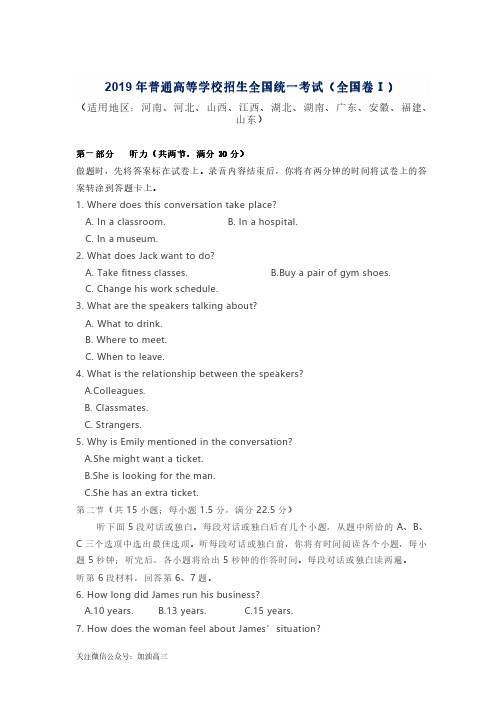
1. Where does this conversation take place?
A. In a classroom.
B. In a hospital.
C. In a museum.
2. What does Jack want to do?
A. Take fitness classes.
B.Buy a pair of gym shoes.
听力原文
Text 1
W:Excuse me,sir.Visiting hours are over now.Your wife must get some rest.
M:Oh,I'm sorry,doctor.I didn't hear the bell,or I would have left earlier.
关注微信公众号:加油高三
Text 2 M:Hello,my name is Jack. I need to get in shape.How do I register for the classes? M:We'll need you to join the gym, and then you could find out which classes fit your schedule the best.
Text 6: W:Did you know James went out of business?
关注微信公众号:加油高三
M:Really?When was that? W:Last month. M:That's too bad.He had owned that business for 15 years.What happened? W:I don't know. But life must be pretty tough for his family now. His sons are still so young;one is 13,and the other is ten. M:Well,maytbe things are not as bad as they seem to be. W:I hope so.
- 1、下载文档前请自行甄别文档内容的完整性,平台不提供额外的编辑、内容补充、找答案等附加服务。
- 2、"仅部分预览"的文档,不可在线预览部分如存在完整性等问题,可反馈申请退款(可完整预览的文档不适用该条件!)。
- 3、如文档侵犯您的权益,请联系客服反馈,我们会尽快为您处理(人工客服工作时间:9:00-18:30)。
绝密★启用前2019年普通高等学校招生全国统一考试(全国卷I)英语第一部分听力(共两节,满分30分)做题时,先将答案标在试卷上。
录音内容结束后,你将有两分钟的时间将试卷上的答案转涂到答题卡上。
第一节(共5小题;每小题1.5分,满分7.5分)听下面5段对话。
每段对话后有一个小题,从题中所给的A、B、C三个选项中选出最佳选项。
听完每段对话后,你都有10秒钟的时间来回答有关小题和阅读下一小题。
每段对话仅读一遍。
例:How much is the shirt?A. £19.15.B. £9.18.C. £9.15.答案是C。
1. Where does this conversation take place?A. In a classroom.B. In a hospital.C. In a museum.2. What does Jack want to do?A. Take fitness classes.B. Buy a pair of gym shoes.C. Change his work schedule.3. What are the speakers talking about?A. What to drink.B. Where to meet.C. When to leave.4. What is the relationship between the speakers?A. Colleagues.B. Classmates.C. Strangers.5. Why is Emily mentioned in the conversation?A. She might want a ticket.B. She is looking for the man.C. She has an extra ticket.第二节(共15小题;每小题1.5分,满分22.5分)听下面5段对话或独白。
每段对话或独白后有几个小题,从题中所给的A、B、C三个选项中选出最佳选项。
听每段对话或独白前,你将有时间阅读各个小题,每小题5秒钟;听完后,各小题将给出5秒钟的作答时间。
每段对话或独白读两遍。
听第6段材料,回答第6、7题。
6. How long did James run his business?A. 10 years.B. 13 years.C. 15 years.7. How does the woman feel about James’ situation?A. Embarrassed.B. Concerned.C. Disappointed.听第7段材料,回答第8至10题。
8. What has Kate’s mother decided to do?A. Return to school.B. Change her job.C. Retire from work.9. What did Kate’s mother study at college?A. Oil painting.B. Art history.C. Business administration.10. What is Kate’s attitude toward her mother’s decision?A. Disapproving.B. Ambiguous.C. Understanding.听第8段材料,回答第11至13题。
11. What is the man doing?A. Chairing a meeting.B. Hosting a radio program.C. Conducting a job interview.12. What benefits Mary most in her job?A. Her wide reading.B. Her leaders' guidance.C. Her friends' help.13. Who will Mary talk about next?A. Her teacher.B. Her father.C. Her mother.听第9段材料,回答第14至17题。
14. Why does the man seldom do exercise?A. He lacks motivation.B. He has a heart problem.C. He works all the time.15. What does Jacob Sattelmair probably do?A. He’s an athlete.B. He’s a researcher.C. He’s a journalist.16. Why does the woman speak of a study?A. To encourage the man.B. To recommend an exercise.C. To support her findings.17. How much time will the man probably spend exercising weekly?A. 300 minutes.B. 150 minute.C. 75 minutes.听第10段材料,回答第18至20题。
18. What did the scientists do to the road?A. They repaired it.B. They painted it.C. They blocked it19. Why are young birds drawn to the road surface?A. It’s warm.B. It’s brown.C. It’s smooth.20. What is the purpose of the scientists’ experiment?A. To keep the birds there for a whole year.B. To help students study the birds well.C. To prevent the birds from being killed.2019年普通高等学校招生全国统一考试(全国卷I)参考答案第一部分听力1. B2. A3. B4. C5. A6. C7. B8. A9. C 10. C11. B 12. A 13. C 14. A 15. B16. A 17. C 18. B 19. A 20. C听力录音稿(Text 1)W: Excuse me, sir. Visiting hours are over now. Your wife must get some rest. M: Oh, I’m sorry, doctor. I didn’t hear the bell or I would have left earlier. (Text 2)M: Hello, my name is Jack. I need to get in shape. How do I register for the classes?W: We’ll need you to join the gym, and then you can find out which classes fit your schedule the best.(Text 3)W: I’ll see you at the theater.M: Better still. Let’s meet in the Red Lion Bar to have a nice little talk.W: Good idea. And I’d love to have a drink there.(Text 4)M: Hello, my name is John Arber, and I’m calling to ask about the position advertised in Friday’s .W: Yes, the position is still open. You could come over and have a talk with us. (Text 5)M: I have an extra ticket to the concert tonight. Would you like to join me? W: Thanks, but I already have one. You can ask Emily. She might be interested.(Text 6)W: Did you know James went out of business?M: Really? When was that?W: Last month.M: That’s too bad. He had owned that business for fifteen years. What happened?W: I don’t know. But life must be pretty tough for his family now. His sons are still so young. One is thirteen, and the other is ten.M: Well, maybe things are not as bad as they seem to be.W: I hope so.(Text 7)W: Guess what! My mother’s decided to go back to school.M: Why?W: Well, she always loved art but learned business administration at college, because her parents thought it was difficult for an artist to find a job.M: So she wants to study art now?W: Yeah, oil painting. It’s been her dream for a long time.M: It’s nice to return to learn what she loves. But, Kate, I still think old age should be about peace and relaxation. Hurrying to school every day and having to pass exams sounds a bit too much for her.W: You know, she retired last year. And I’m leaving for the university soon. She needs to find something interesting to do.M: Well, maybe, if it’s what she wants.(Text 8)M: Dear listeners, for today’s show I have with me my colleague, Mary Laney. She has been a radio TV reporter for many years. Mary, welcome to our show. W: It’s a pleasure to be here.M: Would you please tell our listeners who most influenced your decision to become a reporter?W: Both my parents had a great influence upon my choice of work. Instead of trying to pick out a job for me, they helped me learn those things that led me to it.M: How did they do that?W: My father always told me that an education was one of the greatest advantages I could have — one that would always stay with me. He used to tell me that readers were leaders and encouraged me to read all I could. As a result, I’ve always kept up with the newspapers, faithfully read news magazines and learned to really enjoy books,all of which have been an invaluable help to me in radio and television reporting.M: What about your mother?W: Well, my mother helped me in a much different way.(Text 9)M: We all know that exercise is good for us, but sometimes it seems too hard to leave the sofa.W: I can see that. You seldom do exercise.M: Plus, having the doctor tell us to get two and a half hours of exercise a week doesn’t really help our motivation much.W: Don’t be discouraged. Now, a new study suggests getting benefits from exercise doesn’t have to be that demanding. Jacob Sattelmair, from Harvard University has done a study into how much exercise is needed to lower the risk of heart attacks.M: Mm, interesting.W: The study showed that people who put in 300 minutes a week of exercise had a 20% lower risk of death due to heart disease. Still, the people who exercised 150 minutes a week did pretty well too, lowering their death risk by 14%.M: And what about the people who exercise half as much as that like what I probably do. Does that help?W: Of course. Even 15 minutes would help.(Text 10)W: Here is a piece of news for bird lovers. Scientists have painted a long road, red, yellow and white.They hope to discourage the seabirds from wandering onto the highway. The area is home to large crowds of birds that come to stay for the season. Young birds are often attracted to the warm road surface and get killed by the traffic. Biologist student Hannah tells the broadcaster, “The youngsters’feathers are brown in color. The dark-colored road surface makes the youngsters hard to be noticed.As the number of tourists has grown, so has the amount of traffic on the roads.” Biologist Christan says the plan is to see how the birds respond to the multicolored road this summer, and if it works, the idea could spread to other parts of the country.。
